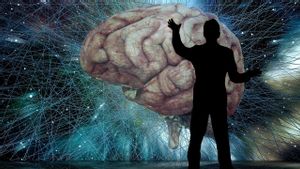YOGYAKARTA Hormone oxytocin is a neurotransmitter that has a major impact on daily activities. Besides being referred to as hormon love, oxytocin is related to social and reproductive interactions. Such as bonding with partners, maternal, collaborative, and sexual behavior.
According to evidence found in the study, oxytocin raises attention to pay attention to social gestures, improves cognitive processes related to social information, and increases efforts to interact socially. Oxytocin may also play a role in changing the level of interest related to social gestures. This leads to values, which are considered attractive and unpleasant with certain social interactions.
Recent research shows that oxytocin can increase empathy, spouse ties, and human communication. Therefore, oxytocin is important as one of the attributes in building lasting and healthy relationships. Both friendship, with partners, and social relationships are wider. But oxytocin, also has an antisocial trait that encourages prejudice and anxiety.
In breastfeeding mothers, skin-to-skin contact triggers the production of breast milk and reflex of breastfeeding during breastfeeding. Launching Psychology Today, Sunday, August 18, during breastfeeding time, oxytocin plays a role in regulating the mood, calm, and increasing the sense of entanglement between mothers. Oxytocin can also reduce sensitivity to pain, blood pressure, and cortisol levels in mothers and babies. In addition, in breastfeeding mothers, the release of oxytocin helps mothers as antidepressant, anti- anxiety, protect against post-treatment depression, and build ties with their babies.
Other studies examine the level of oxytocin with the degree of closeness in romantic relationships. This study found that couples with higher levels of oxytocin at the beginning of the relationship would be more lasting. The oxytocin content did not decrease for the next six months.
To maintain oxytocin levels, some medical recommendations can be followed. Such as with physical touch with a partner, regular exercise, and social interaction positively. But it is also important to understand the effects of high levels of oxytocin and its effects on antisocial. Because according to research, high levels of oxytocin lead to certain behaviors that mark an antisocial attitude. Such as social avoidance, development of phobias, and anxiety disorders. Oxytocin also causes prejudice, whose true goal is to protect its group from other foreign groups. Even so, prejudice tends to be harmful rather than helpful, right?
SEE ALSO:
Research in 2017, Oxytocin mobileizes midbrain dopamine forward sociality was published in the journal Neurons, explaining. That the release of oxytocin causes secretion or inhibition of dopamine. In the award area, dopamine is stimulated and an association built between sensations of pleasure and activities that stimulate oxytocin. Like social interactions that generate entanglement.
The release of oxytocin in motor areas that inhibit dopamine helps reduce socially irrelevant motor activity. Synergy between these two hormones stimulates a sense of appreciation and feelings of euphoria. That's why in a long-term relationship, the release of these two hormones feels so satisfying.
The English, Chinese, Japanese, Arabic, and French versions are automatically generated by the AI. So there may still be inaccuracies in translating, please always see Indonesian as our main language. (system supported by DigitalSiber.id)
















